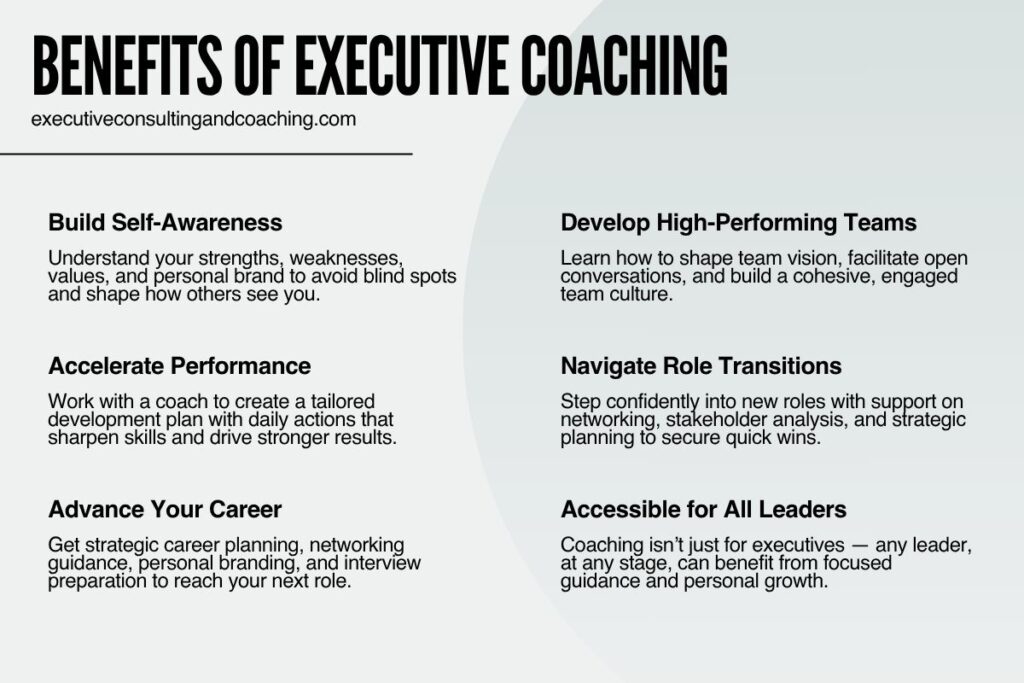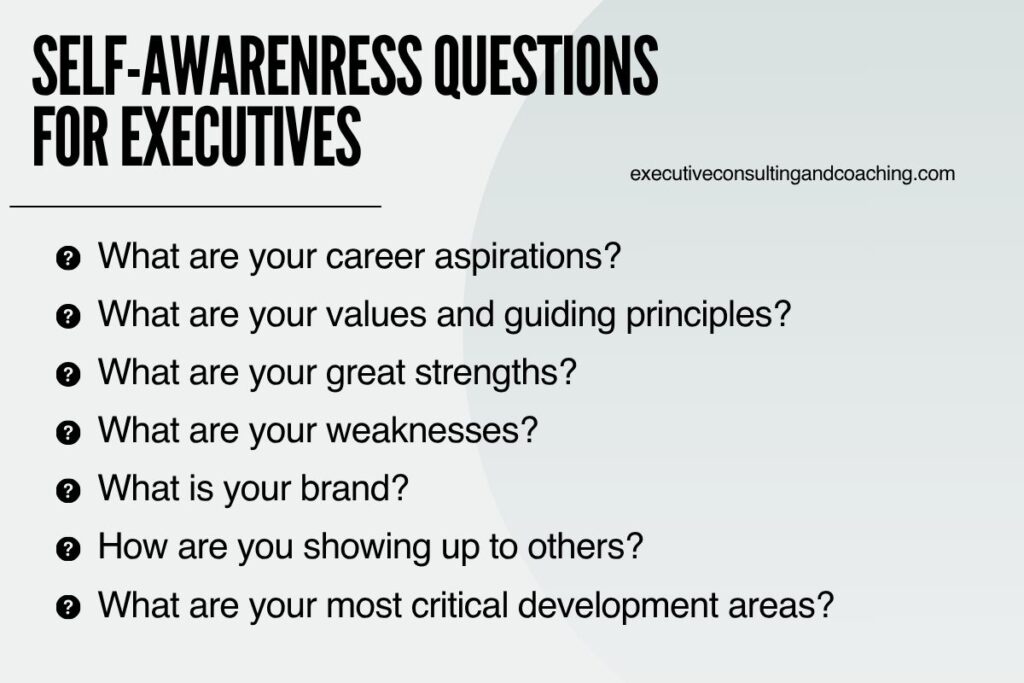
What can an executive coach do for you? I’m sure many of you have considered the opportunity but never fully explored the possibility.
From decades of being an executive coach, I can share that the experience can be life changing. Clients can make a strategic difference in their performance, their career, their brand, and achieve goals that they never thought possible.
Why?
Because they can partner with a highly skilled coach who can help them learn and apply new skills, knowledge, and behaviors and those can make all the difference in their leadership and the way they are perceived.

Building Your Self-Awareness
The starting point is for the client to really learn about themselves.
- What are their career aspirations?
- What are their values and guiding principles?
- What are their great strengths?
- What are their weaknesses?
- What is their brand? How are they showing up to others?
- What are their most critical development areas?
This self-discovery is a critical foundation for development and unto itself can be such an enriching experience. Most leaders do not have a clear understanding of themselves and may be limiting their success because they are operating with notable blind spots.
Some may be unaware that their ego enters the room before they do, and that tendency is alienating colleagues. Some may be unaware their introversion is limiting their influence, credibility, and impact on the organization. Others may not know that a negative brand is out in front of them and damaging their chances for promotion.
What an executive coach can do is bring to light a crystal-clear picture of a client and help them understand the consequences of that image on their performance, their career, and their aspirations. Coaches can leverage 360⁰ assessments, personality assessments, and interviews to create that picture and share strategies and tactics that will create a strategic difference in their brand.
In some cases, a strategy may encompass accelerating a strength that will differentiate the leader to an even greater extent. Focusing on a strength allows leaders to excel in areas where they naturally perform well, leading to increased productivity and business impact.
In other cases, a strategy may encompass addressing a weakness in a competency that is either overplayed or underplayed.
For example, leaders may be operating with an overly directive and autocratic style; working to be more facilitative, inclusive, and collaborative could create a significant shift in their performance and the engagement of their employees. In this sense…
Effective coaching is not about tweaking behaviors or achieving short-term goals. Rather, its main use is to trigger a deeper shift in mindset, habits, and overall life trajectory, leading to significant personal and professional transformations.1

Accelerating Your Performance
Every leader aspires to be as high performing as they can be, and with an executive coach they can partner to achieve their aspirations. Through the assessment process described above, a coach can help prioritize what areas will make a meaningful difference in a leader’s performance. That coach can then create a comprehensive development plan that will accelerate a leader’s development in those areas.
Typically, development plans will encompass a robust variety of tactics that build skills, knowledge, and behaviors. They weave together a tapestry highly customized activities that are on-the-job, (stretch assignments, job shadowing, job enlargement, etc.), are people related (mentors, peer coaches, subject matter experts, etc.), and educational related (books, articles, classes, Ted Talks, etc.). These activities are ones that can and should be implemented every day.
The parallel concept is getting in shape, and that means working out every day. The coach will not only design this plan for you, but also become your “personal trainer” in helping you commit to them and learn from them. The end result over 6-8 months can be transformational.
With rigorous focus, investment, and reflection, leaders can develop a whole new array of capabilities and thus create a significant impact upon their performance. This in turn will have a very positive outcome in end of year reviews, promotions, and succession plans.
Advancing Your Career
Besides building out their performance, an executive coach can make a strategic difference in a leader’s career. The process starts by carefully defining where the leader would like to arc their career. Where would they like to be at the peak of their career? Where would they like to be in 5 years, 3 years, or 1 year?
From there a coach can partner with a leader to determine what competencies, experiences, networks, and credentials they need to achieve each role. This encompasses a career development plan which entails a long-term roadmap of development. This roadmap will detail specific strategies that include networking, interviewing, relationship building, and personal branding that will position the leader to make strategic and successful job moves in each phase of their career.
In the short term an executive coach can help prepare a leader for their next best move by helping them refine their resume, practice interviews, enhance their executive presence, and develop sponsorships for their candidacy. These combined can make a significant difference in a leader being hired or promoted into a new role.
Building a High Performing Team
In addition to contributing to a leader’s performance and career development, an executive coach can be invaluable in helping a leader build a high performing team. The coach can play a significant role in partnering with the leader to establish a team mission, vision and values by facilitating the processes associated with these team components. They can design and lead team offsites including those dedicated to a team analysis where team members share what’s working and not working to enable the team’s performance.
Their neutrality and expertise can ensure that the team is transparent, honest, and capable of addressing any issue/opportunity. Beyond these contributions, they can assist with the development of the team, by supporting individual development plans, team workshops, and engagement surveys.
In many respects they become a shadow consultant for the leader, helping them focus on the activities, processes, and decisions that will create exceptional team performance and differentiate the leader as extraordinary in talent management. As important they become an invaluable sounding board for the leader as they help them analyze and resolve problems and do so under a contract of confidentiality.
Transitioning to New Role
As important as a coach is in the day-to-day leadership of a leader, they can also play a critical role in assisting a leader in successfully transitioning into a new role. As noted by writers like Michael Watkins2 and Niamh O’Keeffe3, the 3 months of transitioning into a new role are critical and can make or break the success of a leader.
To ensure that a leader addresses all the key activities of networking, stakeholder analysis, and strategic planning, a coach can help design and support a comprehensive plan and provide feedback around what’s working and what can be improved.
By tapping into the leader’s network, they can hold a mirror to the leader and help them adapt responsively and thoughtfully to maximize their impact and their acceptance by the organization. Ultimately, they can lay out the guiding principles and a systematic approach which will enable quick wins and avoid errant moves that could undermine a leader’s brand and success.
Executive Coaching for All Leaders
While the title of an executive coach implies that their service is only for senior executives, the reality is that all leaders can benefit from coaching. Regardless of title, seniority, or years in leadership, every leader can benefit from the experience of partnering with an executive coach. All the benefits that have been defined in the above apply universally to anyone in a leadership role – and that includes individual contributors. Everyone can learn and develop from an experienced coach.
Often, receiving coaching in the early phase of a career can make an even greater impact because individuals are more receptive, and they have yet to acquire any bad habits.
The use of executive coaches generally pivots around the cost of a coach. Typically for a 6-month engagement the costs can range from $10K to $60K. If an organization is conservative around their development budget, then they will typically reserve executive coaching for their C Suite and high potentials.
However, some companies have internal executive coaches or HR Business Partners who are trained as executive coaches. That enables the organization to offer coaching services on a much more expanded basis. And, some firms like Executive Coaching and Consulting (ECC) will designate a portion of their coaching services pro bono.
The key for companies is to provide the opportunity wherever and however they can. The data and research all support that executive coaches do create strategic and business impact for an organization by accelerating the development of their leaders.
In turn those leaders evolve engaged, high performing teams and functions, and they in turn have a lasting impact on the company’s culture, growth and profitability.
1 Vikram Kapoor
2 The First 90 Days – Proven Strategies for Getting Up to Speed Faster and Smarter
3 The First 100 Days – Make Maximum Impact in Your New Role


